
Icelandic Parliamentarian Birgitta Jónsdóttir played a critical role in WikiLeaks’ release of the “Collateral Murder” video, which showed a U.S. military helicopter in July 2007 as it killed 12 people and wounded two children in Iraq. Jónsdóttir joins us on her first trip to the United States since a secret grand jury in Alexandria, Virginia, began its investigation of WikiLeaks and Julian Assange. She also discusses her role at the center of another closely watched legal case — challenging of the government’s effort to obtain her Twitter records without a warrant — and why she has come to the United States to champion the cases of military whistleblower Bradley Manning and the accused hacker Jeremy Hammond. [includes rush transcript]
Transcript
AMY GOODMAN: We’re joined now by Birgitta Jónsdóttir, a member of the Icelandic Parliament who played a critical role in WikiLeaks’ release of the collateral video—the “Collateral Murder” video, which we showed in the last segment, the U.S. military helicopter, July 2007, as it killed 12 people and wounded two children. Among the 12 people were two Reuters employees, the Reuters driver Saeed Chmagh, 40 years old, father of four, and Saeed—as well as Namir Noor-Eldeen, a 22-year-old Reuters videographer. This marks Jónsdóttir’s first trip to the United States since a secret grand jury in Alexandria, Virginia, began its investigation of WikiLeaks and Julian Assange. Birgitta Jónsdóttir has also been the center of a closely watched legal case. Earlier this year, a federal appeals court ruled the government can continue to keep secret its efforts to obtain information from Twitter about Jónsdóttir and two others connected to WikiLeaks.
Birgitta Jónsdóttir, welcome to Democracy Now!
BIRGITTA JÓNSDÓTTIR: Thank you very much. So happy to be here.
AMY GOODMAN: It’s very good to have you with us. Talk about why you’ve come to the United States.
BIRGITTA JÓNSDÓTTIR: There are a few reasons, but my main reason is Bradley Manning. I wanted to show him in action my support, and even if it meant that I could face some legal challenges. I just didn’t want to have it hanging over my head. I just wanted to find out while I’m still a member of Parliament. We have elections on the 27th of April. We don’t know how it’s going to go. So I wanted to make sure that I had all the legal protection that a member of Parliament has extra over ordinary citizens, which is also very strange. But it’s so important that the people are aware of what Bradley Manning has now acknowledged that he did. And for me, the most significant is the video, because it—when you have the visual, like war crimes like this, it is very difficult for people not to be moved, and hopefully, moved to do something. So I’m here to actually start an action when the trial starts. I want to try to figure out a way to do something in every state on June 3rd.
AMY GOODMAN: I want to turn to Bradley Manning in his own words, who did acknowledge in a pretrial hearing that he gave hundreds of thousands of classified documents to WikiLeaks, saying he wanted to show the American public the “true costs of war.” I want to go to an excerpt from a leaked audio recording of Bradley Manning in his own words from the military hearing at Fort Meade. Listen very carefully. You know, this wasn’t the optimum situation for recording, as it was surreptitiously done.
BRADLEY MANNING: I believed that if the general public, especially the American public, had access to the information contained within the CIDNE-I and CIDNE-A tables, this could spark a domestic debate on the role of the military and our foreign policy in general, as well as it related to Iraq and Afghanistan.
AMY GOODMAN: That was Bradley Manning saying he wanted to “spark a domestic debate” about U.S. involvement in the wars in Iraq and Afghanistan. Birgitta Jónsdóttir?
BIRGITTA JÓNSDÓTTIR: Yeah, and that’s one of the reasons I’m here, as well, because I think it is important to—for anybody that is aware of the significance of the leaks, all of them, starts a debate and discussion. And that is actually what is already happening, at least in Europe and in other parts of the world. I don’t know exactly how it is here, but I do feel that there is a tremendous support for Bradley as soon as people know what he did, and as soon as they know that he has actually spent more than 1,000 days in prison. And I don’t know how it is for others, but I find it to be absolutely unacceptable that this person will face life in prison.
AMY GOODMAN: You’re an Icelandic member of Parliament. Have you spoken to any of your counterparts here in the United States, members of Congress?
BIRGITTA JÓNSDÓTTIR: I haven’t yet, but I plan to come back in June. So, if there is anybody watching this show and wants to speak to me, I would be very grateful if we could speak together about Bradley Manning and the significance of his work.
AMY GOODMAN: Can you talk about how you have been targeted by the U.S. government?
BIRGITTA JÓNSDÓTTIR: Yes. It’s actually—like, most people don’t understand how serious it is, because—like somebody asked me, “Have you been followed since you came to the States or in Iceland?” And yes, I am followed all the time. But it’s not with the people in the offline world; it is online. And it is much easier to follow people there—everything they do and everybody they meet and at what time.
So, what happened in January 2011, I get an email from Twitter saying that they had taken a subpoena to court and unsealed it. And in it, it said that the Department of Justice wanted all my personal messages and IP numbers and so forth, without my knowledge, within three days. And I was fortunate enough to be represented by EFF and ACLU to try to—
AMY GOODMAN: That’s the Electronic Frontier Foundation—
BIRGITTA JÓNSDÓTTIR: Yes.
AMY GOODMAN: —and American Civil Liberties Union.
BIRGITTA JÓNSDÓTTIR: Yeah. And they did that pro bono, and I’m thankful for that, because it’s an unprecedented case. And unfortunately, we lost it on every count—every account. But it is not only these Twitter messages that they want. There are apparently four other companies that were requested to hand over my information, which they already have.
AMY GOODMAN: What companies?
BIRGITTA JÓNSDÓTTIR: I don’t know. We can’t get it unsealed, by request by the U.S. government. And we’ve taken it again and again to court to try to unseal it, because they say the U.S. government says to the judge that they have investigative interests, or they don’t want me to know because they’re investigating. But they won’t tell me what they’re investigating. And I have been told by the Department of Justice, through the U.S. embassy in Iceland, that I am not the subject of criminal investigation. But the justice system here is so opaque. It’s so impossible to understand how it functions. And like my case is relatively mild compared to the cases I’ve heard of people here in the United States, like Jeremy Hammond and Barrett Brown and all these young, really talented people—and let’s never forget Aaron Swartz—that are being persecuted for things that they would never be persecuted for in my country.
AMY GOODMAN: Aaron Swartz is the young social justice hacktivist, 26 years old, who took his own life a few months ago, committed suicide in Brooklyn, New York, who was being prosecuted by the U.S. government in Massachusetts for—well, their charge was that he had released millions of pages of JSTOR documents, that are available to students all over the country in the United States for free.
BIRGITTA JÓNSDÓTTIR: Yes, I think, like many of these harsh sentences—
AMY GOODMAN: Not for the release of, but for downloading them from a computer at MIT.
BIRGITTA JÓNSDÓTTIR: Yeah, downloading them, yeah, yeah. So, and I think that many of these cases are because—the harshness of them are because those that are putting forward the sentences, they don’t really understand the nature of the Internet and how we function there, those of us that spend a lot of time there working. And—
AMY GOODMAN: Explain what you mean by that.
BIRGITTA JÓNSDÓTTIR: I explain—well, like I started to work on the Internet in '95, and it completely opened up a new world, because all of a sudden I had access to like-minded people that were doing similar things, and we could share knowledge and do projects together. And it is all based on this sort of crowdsourced openness and sharing. So, when you try to put forward all the restrictions we have in the real world—well, actually, the offline world, because the Internet world seems just as real sometimes—it's impossible, because this system was created to be able to bypass all these walls and restrictions. And so, when you grow up in a culture of sharing knowledge, work, passions, friendships, across borders—there are no borders—and so you can’t put up the walls, because we will always find ways around the walls, because it is the nature to crowdsource and share. And that is how we have developed so fast. And that’s how I’m here. I would never be here unless I had lived on the Internet for a while. We could never have released the “Collateral Murder” video like we did, unless we had access to the Internet.
AMY GOODMAN: Talk about your involvement with the release of this video, the “Collateral Murder” video about the killing of 12 people, July 12th, 2007, in New Baghdad, the military Apache helicopter that opened fire. Two of those people were Reuters employees. Reuters had attempted for years to get this videotape. The military or the U.S. government would not give it to them. They only got it when you all released it, now the third anniversary of that release. What did you have to do with this, Birgitta?
BIRGITTA JÓNSDÓTTIR: I come from an activist background, that whenever something is needed to be done, I just do it. And so, when I saw the video in February 2010, I was profoundly moved. I was moved to tears, like many people that watch it. But at the same time, I understood its significance and how it might be able to change our world and make it better. And so, I offered to help in any which way possible.
AMY GOODMAN: Were you a parliamentarian at the time?
BIRGITTA JÓNSDÓTTIR: Yes. I did—like I participated, before the Iraq War started, with millions of people from around the world in an attempt to stop the war from happening. So I knew that this would happen. To have it actually in my living room in front of my eyes, the true horror of war and all these war crimes that I had heard of but I’d never seen, felt to me as important enough to take a little bit of a risk. So, I did a lot of the background investigation. I organized the Icelandic volunteer team. I pulled out the photos that we put on the website. And I was the coordinator for the YouTube account.
AMY GOODMAN: This is when you were all, with Julian Assange, holed up in Iceland preparing to release this videotape?
BIRGITTA JÓNSDÓTTIR: Yeah. We actually rented—I rented a really nice old house in the center of the city, so it wasn’t really a bunker.
AMY GOODMAN: In Reykjavik.
BIRGITTA JÓNSDÓTTIR: Yeah. It wasn’t really a bunker.
AMY GOODMAN: When I said “holed up,” I didn’t mean— like in some legal sense.
BIRGITTA JÓNSDÓTTIR: Yeah.
AMY GOODMAN: —like in some legal sense, but you were all in this place.
BIRGITTA JÓNSDÓTTIR: Well, we called it “the bunker,” out of a joke, and then everybody thought it was like a bunker. And there was actually porcelain cats in the windows and stuff, so… But it was an incredible and complex action, because it had to be done completely in secrecy. And then we got Kristinn, who was just earlier on the show, and his cameraman to go off to Iraq. And that was very dangerous, because it was just around the elections, and nobody had been into this area before. And at the same time, we are like working on the video to try to figure out what’s on it. And gradually, all these dots and pixels become real people. And that is really the importance of it. It is so easy to brush away—it looks like a video game the first time you see it, and in particularly if you listen to what the people are saying. But I think that the most—
AMY GOODMAN: For our—for our TV audience, we’re going to show the video as you’re talking, that we just played.
BIRGITTA JÓNSDÓTTIR: Right.
AMY GOODMAN: And for our audio and radio audience, they can go online at democracynow.org, if you’re not familiar with that video. But go ahead.
BIRGITTA JÓNSDÓTTIR: Yeah, I really urge everybody to watch it. And if they’ve seen it before, watch it again. Yeah, so, I think the most moving moment—I was in Iceland because I had to go back to my parliamentary work; I spent all my Easter holiday working on this project—was, I was sitting and maintaining the YouTube account in my home, and I get a message on it from a soldier that says, “I am the soldier that found the children and moved them to safety. I have never been able to stop thinking about them.” And that turned to be Ethan McCord.
AMY GOODMAN: And I want to encourage people to go to our website at democracynow.org to see the extended interview with Ethan McCord, who got—he was one of the soldiers on the ground, right?
BIRGITTA JÓNSDÓTTIR: Yes, yes.
AMY GOODMAN: Who shows up at the scene, gets these critically wounded children, and cannot get them out of his mind, goes back to base, asks for help, for emotional help, and he said his commanding officer said, “Suck it up.”
BIRGITTA JÓNSDÓTTIR: Yes.
AMY GOODMAN: And he deteriorated from then on emotionally.
BIRGITTA JÓNSDÓTTIR: Yes. He is very brave. And I have so much respect for people like him that actually dare to challenge the injustice that is brought on them. There are so many young people that are in the—like in the military because they can’t afford to go to college. And then they’re faced with this incredibly hostile environment, where like you are on one second with a dying child in your hand, and on the other second you’re told to suck it up instead of getting proper consultation. I think that is very disturbing, because it will bring broken people back home. And that’s why there are so many broken things here.
AMY GOODMAN: I want to turn to the case of the jailed computer hacker Jeremy Hammond, an alleged member of the group Anonymous charged with hacking into the computers of the private intelligence firm Strafor and turning over some five million emails to the whistleblowing website WikiLeaks. Jeremy Hammond could face a life term. Last Friday, Birgitta Jónsdóttir, you read a poem to him outside his jail. We’re going to go to a clip of that.
BIRGITTA JÓNSDÓTTIR: I have seen signs. The end of the world as we know it has begun. Don’t panic. It might look terrifying on the surface, but inside every human being a choice to act out of fear or love. Earth is calling. God is calling. Sky is calling. Creation is calling. Wake up. Wake up now. Generate the capacity for love, for compassion in your heart. Now is the time to yield to the call of growth, to the call of action. You, you are the change makers. Sleepers of all ages, wake up. Wake up now.
AMY GOODMAN: That is Birgitta Jónsdóttir, standing—member of Parliament of Iceland, standing outside the jail where Jeremy Hammond is now, in New York City. Why did you do this? Why, Birgitta, is Jeremy Hammond important to you?
BIRGITTA JÓNSDÓTTIR: In general, all political prisoners are important to me. I don’t care in which country or place they are. He is being—his particular case is very shocking to me, you know, the fact that he faces up to 45 years in prison for something like that. And—
AMY GOODMAN: Explain what he’s accused of doing.
BIRGITTA JÓNSDÓTTIR: Well, he’s accused of leaking material to WikiLeaks.
AMY GOODMAN: From Stratfor.
BIRGITTA JÓNSDÓTTIR: Yeah, and Stratfor, I think, was the company that was hired to probe into people that were involved with WikiLeaks’ lives. So, what—
AMY GOODMAN: In fact, Stratfor, in the trove of emails, the millions of emails that WikiLeaks released, was one from a vice president of Stratfor that had a sealed indictment against Julian Assange, a secret indictment. Now, it’s not clear if it’s true. This is what has concerned Julian for quite some time now, that if he were—that he could be extradited to the United States and that there is a secret indictment against him.
BIRGITTA JÓNSDÓTTIR: Like, the thing is, I don’t see any difference between what the government is doing and then what Jeremy Hammond is accused of doing. So why isn’t the U.S. government then held accountable for probing into people’s lives like this? I mean, it’s very serious that they probed into my life. They actually literally went into my home, through the Internet door, and I’m a member of Parliament. And this has been like a worldwide incident, where the International Parliamentary Union actually put forward a very harsh parliamentary proposal, unanimously adopted by the International Parliamentary Union, because parliamentarians, for example, are encouraged all the time to be working across nations. And then, like everybody that writes me is now on the desk of the FBI. Is that OK? So what’s the difference from what Jeremy Hammond did than what the U.S. government did? They are not—I’m not the subject of criminal investigation, so what gives them the right to go into my personal stuff? Or what gives Stratfor the right to go into Julian Assange’s personal stuff or anybody that’s associated with WikiLeaks?
I think it is really time to stop the witch hunt on people that are involved with journalism and whistleblowing. And it is of deep concern to me that this country, the United States of America, which had one of the most significant trials in the world in relation to freedom of expression and speech, when Lawrence Ferlinghetti went on trial a long time ago to defend just these values—and many people here—
AMY GOODMAN: Lawrence Ferlinghetti, the poet and publisher of City Lights.
BIRGITTA JÓNSDÓTTIR: Yes, one of my heroes, and for exactly that and what he stood for. And he is a hero in East Europe, but people might not remember that, that we who look on the United States today look at the situation like you have moved towards China, not towards Europe. And that is troubling to me, because I really care for this country.
AMY GOODMAN: Your visit here comes on the heels of a revelation in February by Iceland’s justice minister that in August of 2011 Icelandic lawmakers expelled several FBI agents who had flown into Iceland in their own plane, landed—and then, describe what happened. Were you a—were you a lawmaker then, in the Parliament?
BIRGITTA JÓNSDÓTTIR: Yes, yes, I was. I didn’t know about this until this came into the media just recently. And we have had a series of committee meetings about this incident with the state prosecutor, with the mysterious Mr. Q and Kristinn Hrafnsson and, you know, various others to try to understand what was going on.
And in a—I’ll try to explain it very quickly. It’s very complex. But basically, it originally starts with that the FBI contacts the Icelandic state prosecutor and says Iceland is under imminent attack by the hackers group LulzSec. They are going to—
AMY GOODMAN: LulzSec.
BIRGITTA JÓNSDÓTTIR: Yes. And they are going to go and, like, steal all the documents from the state. And then they sent off the Icelandic state prosecutor and the chief of police to the United States to see further evidence. Now, anybody that knows anything about the hacker community and Anonymous and so forth knows that LulzSec was created by Sabu, which was an FBI agent. And so that’s how they—
AMY GOODMAN: Sabu was an FBI agent.
BIRGITTA JÓNSDÓTTIR: Yes.
AMY GOODMAN: His name is codename Sabu.
BIRGITTA JÓNSDÓTTIR: Yeah, codename Sabu. So, he was like organizing with the mysterious Siggi, or Mr. Q, which was then later on found out—which we discovered was also then turned around agent for the FBI, or at least collaborating with them. So there was this staged attack on Iceland to come into Iceland to help the Icelandic government in setting up stronger shields against hackers. And I really hope that they never got their hands on our software, because then we have to like buy new equipment so they haven’t created back doors into our country. But so then they just carry on the investigation. Like, originally, it was about imminent attack. And then, all of a sudden, it turned into a WikiLeaks investigation. And Siggi, he apparently went to the U.S. embassy. He was then a WikiLeaks volunteer of some sort—went to the U.S. embassy and said, “I want to be an informant.” And he spent about 70 hours with the FBI in Iceland, Washington and Denmark telling pathological lies about some Icelanders.
AMY GOODMAN: I want to thank you very much for being with us. The FBI agents were turned around?
BIRGITTA JÓNSDÓTTIR: They were, by the interior minister.
AMY GOODMAN: They flew in on a private plane—or in a government plane?
BIRGITTA JÓNSDÓTTIR: Yeah, yeah. I think there like—I don’t know—10 or 13 or something.
AMY GOODMAN: And they were told to get out of town?
BIRGITTA JÓNSDÓTTIR: Yes.
AMY GOODMAN: And they did?
BIRGITTA JÓNSDÓTTIR: Yes, I think so.
AMY GOODMAN: This is part one of our interview. After the broadcast, we’ll continue to talk to her about—to Birgitta Jónsdóttir about the new party she’s establishing in Iceland, a political party, and other issues. So go to our website at democracynow.org for part two. Click here to see Part 2 of this interview. Birgitta Jónsdóttir, member of the Icelandic Parliament.
This is Democracy Now! We’re just going to break for 30 seconds, then come back to talk about the late breaking news that the former prime minister of Britain, Margaret Thatcher, has died. Stay with us.

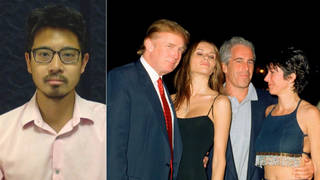
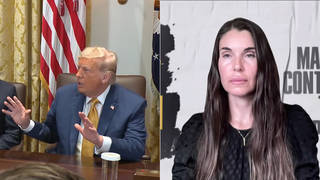
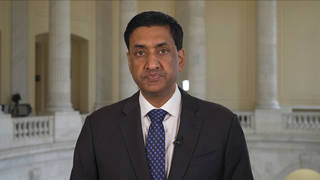
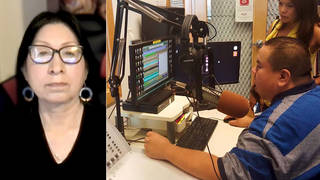





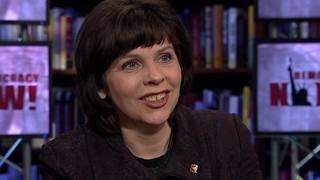

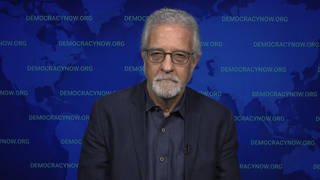
Media Options